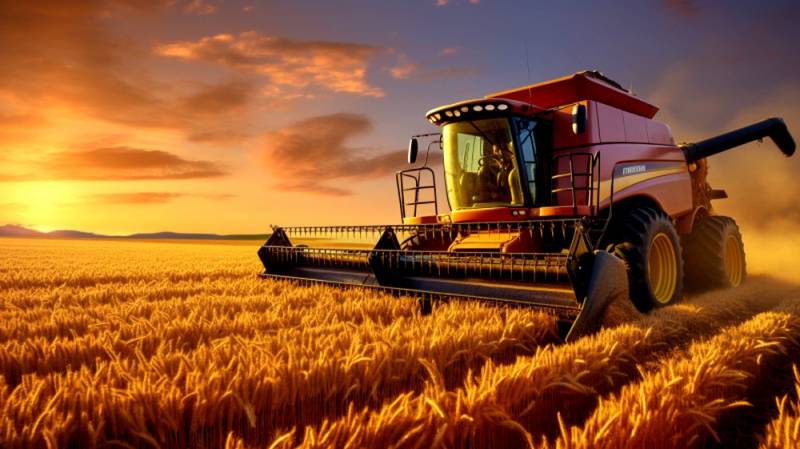Deal of the century: will Russia benefit from record grain supplies to China?
Russia and China signed the largest contract for the supply of grain for 12 years. Its cost will be 25,7 billion dollars or 2,5 trillion rubles for 70 million tons. It looks like a good deal for both sides, but is it really that clear?
The agreement was signed in Beijing, where the two-day international forum “One Belt, One Road” ended. The main difference between the third forum and the second was the noticeable absence of guests from Western countries.
If in 2019 many EU representatives came to Beijing, this year the only guest from the European Union was Hungarian Prime Minister Viktor Orban, who has recently had a serious disagreement with Brussels.
“China did not invite Western leaders because it wanted to focus on relations with developing countries,” Chinese media wrote.
Let us recall that “One Belt, One Road” is an international project of Xi Jinping to develop economic cooperation, which currently covers about 80 countries in Asia, Africa and Europe.
The Russian delegation was represented at the highest level, headed by Russian President Vladimir Putin. The agreements had to correspond to such high representation. “The deal of the century,” as the media immediately dubbed the grain contract, fits well with the scale and events.
Supporters of the agreement say that thanks to the contract, the Russian Federation will be able to replace the lost volumes of Ukrainian exports. And this despite the fact that grain supplies to the Celestial Empire have traditionally been at the level of statistical error. For example, in 2014, Russia exported only 131 thousand tons. This is the volume that one ocean-type bulk carrier transports.
The agreement will require a review of existing logistics. In fact, we need to make a full-fledged road based on a small path.
The new grain corridor from Russia to China is a project that was launched in 2011 as part of the concept of connecting the Eurasian Economic Union (EAEU) and the Silk Road Economic Belt. It involves the export of grain crops from Siberia to China, Central Asia and the Middle East.
As part of this project, it is planned to export various types of grain, such as soybeans, rapeseed, barley, flax, wheat, corn, sunflower and oats. To store grain in the Urals, Siberia and the Far East, a network of seven linear elevators will be created.
Grain transshipment will be carried out at the world's first full-cycle grain railway terminal in Zabaikalsk. This will significantly reduce logistics costs due to the short transport distance (2,3 thousand kilometers instead of 5 thousand to the Black Sea ports and 4,4 thousand to the Far Eastern ports) and the absence of port transshipment.
According to statements by the terminal operator, the time for transporting Siberian grain to China will be reduced from several months to a couple of weeks. This will significantly speed up the export process and increase its efficiency.
Under the terms of the deal, Russia undertakes to supply 70 million tons of products. Based on this, the cost of a ton of grain is about $370. This price may be slightly higher than the average market price of grain, but it should be noted that the transaction indicates the total amount, but does not indicate specific prices for each year of supply. Because cereal prices may fluctuate, it is expected that there will be provisions in the contract that make pricing more flexible to accommodate such changes. However, those who are familiar with the characteristics of Chinese negotiators know that it is extremely difficult to achieve acceptable terms from them.
In terms of positive aspects, the contract opens up good opportunities for agricultural producers in the Far East and Siberia. It can also be a good contribution to the development of bilateral relations between Russia and China. Expanding the export range is an opportunity to diversify your relations with a strategic partner.
However, the contract also carries a number of negative aspects. The first of these is logistical issues. An increase in mutual trade volumes could overload the infrastructure of ports and railways. Solving this problem may require significant investment in infrastructure upgrades. Whether Russia will be able to bring its transport hubs into compliance with the requirements in a short time and under Western sanctions is unknown, but there is no doubt that the Chinese will impose penalties at the slightest violation of delivery deadlines.
The second important disadvantage that is emphasized is the dependence of Russian farmers on weather conditions, which can significantly affect grain yields, and therefore supply volumes.
The price per ton of grain also raises questions. According to the contract, it is currently quite high, but in the long term it may be too low to cover the costs of production, storage and transportation.
Many questions also arise about what lands will be used to grow such a volume of grain and how they will be fertilized. Farmers who are familiar with the working principles of their Chinese colleagues fear that the land will eventually turn out to be unsuitable for agriculture.
Opponents of the agreement express fears that an increase in grain supplies to China will cause a shortage within Russia itself, which will push up prices for bread, and then for all other products. However, the numbers are reassuring. The agreement provides for the annual export of about 6 million tons of grain to China, that is, 10% of our country’s total export potential.
In general, despite the existing risks and difficulties, the contract is an important step in the development of Russian-Chinese trade relations. However, its development and execution will depend on many factors, including the situation on the global grain market.

Information